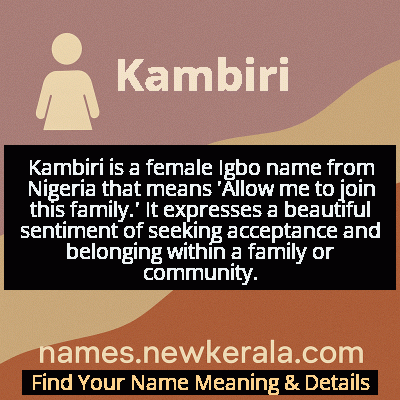Kambiri Name Meaning & Details
Origin, Popularity, Numerology Analysis & Name Meaning of Kambiri
Discover the origin, meaning, and cultural significance of the name KAMBIRI. Delve into its historical roots and explore the lasting impact it has had on communities and traditions.
Name
Kambiri
Gender
Female
Origin
African
Lucky Number
9
Meaning of the Name - Kambiri
Kambiri is a female Igbo name from Nigeria that means 'Allow me to join this family.' It expresses a beautiful sentiment of seeking acceptance and belonging within a family or community.
Kambiri - Complete Numerology Analysis
Your Numerology Number
Based on Pythagorean Numerology System
Ruling Planet
Mars
Positive Nature
Generous, passionate, energetic, and humanitarian.
Negative Traits
Impulsive, impatient, moody, and can be overly emotional.
Lucky Colours
Red, maroon, scarlet.
Lucky Days
Tuesday.
Lucky Stones
Red coral, garnet.
Harmony Numbers
1, 2, 3, 6.
Best Suited Professions
Military, sports, philanthropy, leadership roles.
What People Like About You
Courage, energy, leadership, generosity.
Famous People Named Kambiri
Kambiri Nwosu
Community Leader
Founded women's empowerment initiatives in southeastern Nigeria
Kambiri Okoro
Educator
Established literacy programs for rural Igbo communities
Kambiri Eze
Cultural Preservationist
Documented and preserved traditional Igbo naming ceremonies
Name Variations & International Equivalents
Click on blue names to explore their detailed meanings. Gray names with will be available soon.
Cultural & Historical Significance
Extended Personality Analysis
Women bearing the name Kambiri typically exhibit personality traits that beautifully mirror the name's meaning of seeking inclusion and building family bonds. They are naturally diplomatic individuals who possess an innate ability to sense when others feel excluded or marginalized, and they actively work to create environments of belonging. Their emotional intelligence is often highly developed, allowing them to navigate complex social situations with grace and understanding. These individuals tend to be excellent mediators and peacemakers, capable of seeing multiple perspectives and finding common ground where others see only division. While they are community-focused, they also demonstrate remarkable inner strength and resilience, having learned that true inclusion requires both softness and boundaries. Their leadership style is typically collaborative rather than authoritarian, and they excel in roles that require building consensus and fostering team cohesion. The challenges they face often relate to learning to balance their natural inclination to include everyone with the practical necessity of maintaining healthy boundaries and self-care.
Modern Usage & Popularity
In modern contexts, Kambiri continues to be used primarily within Igbo communities in Nigeria and throughout the global diaspora, though it remains relatively uncommon compared to more popular Igbo names. Its usage reflects a conscious choice by parents to honor traditional values of community and inclusion in an increasingly individualistic world. The name has maintained consistent but modest popularity, often chosen by families with strong connections to cultural preservation or those who value the specific message of welcome and acceptance that the name conveys. Among younger generations and in urban settings, the name might be adapted with modern nicknames while preserving its full traditional form for official purposes. The global reach of Nigerian culture through music, film, and literature has introduced names like Kambiri to broader audiences, though it remains most meaningful within its original cultural context. Digital platforms have created new opportunities for discussing and celebrating such culturally significant names, helping to ensure their transmission to future generations.
Symbolic & Spiritual Meanings
Symbolically, Kambiri represents the profound human truth that identity and belonging are created through relationship and acceptance. The name serves as a living metaphor for the idea that families and communities are not closed systems but dynamic entities that grow stronger through the conscious act of inclusion. It symbolizes the threshold between stranger and family, the moment of transformation when someone moves from being an outsider to being embraced as one's own. This symbolic meaning extends beyond literal family contexts to represent any situation where barriers are broken down and new connections are formed. The name carries the symbolic weight of hospitality as a sacred duty, reflecting the ancient understanding that welcoming the stranger might mean entertaining angels unawares. In a world often divided by boundaries of various kinds, Kambiri stands as a symbolic reminder that our shared humanity is ultimately more significant than our differences, and that the courage to say 'allow me to join this family' is one of the most transformative acts a person can undertake.

